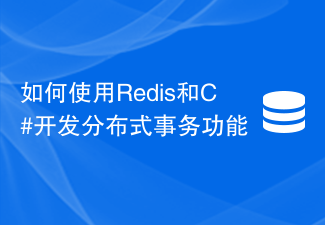 Backend Development
Backend Development C#.Net Tutorial
C#.Net Tutorial C# basic knowledge compilation: basic knowledge (4) inheritance
C# basic knowledge compilation: basic knowledge (4) inheritance As mentioned earlier, the three major characteristics of object-oriented: encapsulation, inheritance and polymorphism. We have almost fully understood the encapsulation in the definition of the previous class. Now let’s look at the characteristics of inheritance.
Inheritance is actually an extension of one class to another class. The latter is called a base class, and the former is called a subclass. Inheritance means that the subclass has all the attributes and methods of the base class, and the subclass can also add attributes and methods. However, subclasses cannot remove the attributes and methods of the parent class.
Of course, the issue of modifiers is also mentioned here. The subclass has all the properties and methods of the base class, but it does not mean that the subclass can arbitrarily access these inherited properties and methods. Subclasses can only access public and protected properties and methods, and the rest cannot be accessed directly. Another thing is that static properties and methods cannot be inherited, because the static type is related to the class and has nothing to do with the object.
Look at the code:
using System;
namespace YYS.CSharpStudy.MainConsole
{
public class YSchool
{
private int id = 0;
private string name = string.Empty;
public int ID
{
get
{
return this.id;
}
}
public string Name
{
get
{
return name;
}
}
/// <summary>
/// 构造器
/// </summary>
public YSchool()
{
this.id = 0;
this.name = @"清华大学附中";
}
/// <summary>
/// 构造器
/// </summary>
public YSchool(int id, string name)
{
this.id = id;
this.name = name;
}
/// <summary>
/// 构造器
/// </summary>
public YSchool(int id)
{
this.id = id;
this.name = @"陕师大附中";
}
}
public class YTeacher
{
private int id = 0;
private string name = string.Empty;
private YSchool school = null;
private string introDuction = string.Empty;
private string imagePath = string.Empty;
/// <summary>
/// 使用只读属性,因为是固有属性。
/// </summary>
public int ID
{
get
{
return id;
}
}
public string Name
{
get
{
return name;
}
}
/// <summary>
/// 这几个使用get/set属性,因为这几个属性不是固有的,可以随着某些条件改变的。
/// </summary>
public YSchool School
{
get
{
if (school == null)
{
school = new YSchool();
}
return school;
}
set
{
school = value;
}
}
public string IntroDuction
{
get
{
return introDuction;
}
set
{
introDuction = value;
}
}
public string ImagePath
{
get
{
return imagePath;
}
set
{
imagePath = value;
}
}
public YTeacher(int id, string name)
{
this.id = id;
this.name = name;
}
/// <summary>
/// 给学生讲课的方法
/// </summary>
public void ToTeachStudents()
{
Console.WriteLine(string.Format(@"{0} 老师教育同学们: Good Good Study,Day Day Up!", this.name));
}
/// <summary>
/// 惩罚犯错误学生的方法
/// </summary>
/// <param name="punishmentContent"></param>
public void PunishmentStudents(string punishmentContent)
{
Console.WriteLine(string.Format(@"{0} 的{1} 老师让犯错误的学生 {2}。", this.School.Name, this.name, punishmentContent));
}
}
/// <summary>
/// 男性老师,继承自YTeacher
/// </summary>
public class MrTeacher : YTeacher
{
/// <summary>
/// 构造器,这里要注意,YTeacher是没有提供默认构造器的,
/// 所以子类必须要有构造器,并且和基类参数列表一致。
/// </summary>
/// <param name="id"></param>
/// <param name="name"></param>
public MrTeacher(int id, string name)
: base(id, name)
{
}
/// <summary>
/// 扩展的方法,刮胡子方法。
/// </summary>
public void Shave()
{
Console.WriteLine(string.Format(@"{0} 老师用飞科剃须刀刮胡子。",this.Name));
}
}
/// <summary>
/// 女性老师,继承自YTeacher
/// </summary>
public class MisTeacher : YTeacher
{
/// <summary>
/// 构造函数
/// </summary>
/// <param name="id"></param>
/// <param name="name"></param>
public MisTeacher(int id, string name)
: base(id, name)
{
}
/// <summary>
/// 扩展方法,护肤的方法
/// </summary>
public void SkinCare()
{
Console.WriteLine(string.Format(@"{0} 老师用香奈儿护肤霜护肤。",this.Name));
}
}
}using System;
namespace YYS.CSharpStudy.MainConsole
{
class Program
{
static void Main(string[] args)
{
MrTeacher mrTeacher = new MrTeacher(1, @"牛轰轰");
mrTeacher.ToTeachStudents();
mrTeacher.PunishmentStudents(@"背唐诗");
mrTeacher.Shave();
MisTeacher misTeacher = new MisTeacher(2, @"郝漂靓");
misTeacher.ToTeachStudents();
misTeacher.PunishmentStudents(@"默写红楼梦");
misTeacher.SkinCare();
Console.ReadKey();
}
} Result:

Inheritance is an object-oriented feature, and its benefits are:
First, when doing project design classes , inheritance allows us to omit a lot of code;
Second, it conforms to the organizational form of classes in object-oriented. In advanced object-oriented languages such as C# and Java, there is an object class, which is the ancestor class of all classes. All classes are derived from him.
One thing you need to pay attention to when inheriting is the constructor of subclasses. During the program running process, the subclass first calls the constructor of the parent class. If the subclass does not write a constructor, the default constructor of the parent class will be called. If the parent class does not have a default constructor, that is, the parent class writes a constructor with parameters, then the subclass will also call the constructor with parameters, but you need to specify which constructor with parameters is called (see the base in the code ).
The above is the summary of C# basic knowledge: basic knowledge (4) inheritance content. For more related content, please pay attention to the PHP Chinese website (www.php.cn)!
 如何使用C#编写时间序列预测算法Sep 19, 2023 pm 02:33 PM
如何使用C#编写时间序列预测算法Sep 19, 2023 pm 02:33 PM如何使用C#编写时间序列预测算法时间序列预测是一种通过分析过去的数据来预测未来数据趋势的方法。它在很多领域,如金融、销售和天气预报中有广泛的应用。在本文中,我们将介绍如何使用C#编写时间序列预测算法,并附上具体的代码示例。数据准备在进行时间序列预测之前,首先需要准备好数据。一般来说,时间序列数据应该具有足够的长度,并且是按照时间顺序排列的。你可以从数据库或者
 如何使用Redis和C#开发分布式事务功能Sep 21, 2023 pm 02:55 PM
如何使用Redis和C#开发分布式事务功能Sep 21, 2023 pm 02:55 PM如何使用Redis和C#开发分布式事务功能引言分布式系统的开发中,事务处理是一项非常重要的功能。事务处理能够保证在分布式系统中的一系列操作要么全部成功,要么全部回滚。Redis是一种高性能的键值存储数据库,而C#是一种广泛应用于开发分布式系统的编程语言。本文将介绍如何使用Redis和C#来实现分布式事务功能,并提供具体代码示例。I.Redis事务Redis
 如何实现C#中的人脸识别算法Sep 19, 2023 am 08:57 AM
如何实现C#中的人脸识别算法Sep 19, 2023 am 08:57 AM如何实现C#中的人脸识别算法人脸识别算法是计算机视觉领域中的一个重要研究方向,它可以用于识别和验证人脸,广泛应用于安全监控、人脸支付、人脸解锁等领域。在本文中,我们将介绍如何使用C#来实现人脸识别算法,并提供具体的代码示例。实现人脸识别算法的第一步是获取图像数据。在C#中,我们可以使用EmguCV库(OpenCV的C#封装)来处理图像。首先,我们需要在项目
 Redis在C#开发中的应用:如何实现高效的缓存更新Jul 30, 2023 am 09:46 AM
Redis在C#开发中的应用:如何实现高效的缓存更新Jul 30, 2023 am 09:46 AMRedis在C#开发中的应用:如何实现高效的缓存更新引言:在Web开发中,缓存是提高系统性能的常用手段之一。而Redis作为一款高性能的Key-Value存储系统,能够提供快速的缓存操作,为我们的应用带来了不少便利。本文将介绍如何在C#开发中使用Redis,实现高效的缓存更新。Redis的安装与配置在开始之前,我们需要先安装Redis并进行相应的配置。你可以
 如何使用C#编写动态规划算法Sep 20, 2023 pm 04:03 PM
如何使用C#编写动态规划算法Sep 20, 2023 pm 04:03 PM如何使用C#编写动态规划算法摘要:动态规划是求解最优化问题的一种常用算法,适用于多种场景。本文将介绍如何使用C#编写动态规划算法,并提供具体的代码示例。一、什么是动态规划算法动态规划(DynamicProgramming,简称DP)是一种用来求解具有重叠子问题和最优子结构性质的问题的算法思想。动态规划将问题分解成若干个子问题来求解,通过记录每个子问题的解,
 C#开发中如何处理跨域请求和安全性问题Oct 08, 2023 pm 09:21 PM
C#开发中如何处理跨域请求和安全性问题Oct 08, 2023 pm 09:21 PMC#开发中如何处理跨域请求和安全性问题在现代的网络应用开发中,跨域请求和安全性问题是开发人员经常面临的挑战。为了提供更好的用户体验和功能,应用程序经常需要与其他域或服务器进行交互。然而,浏览器的同源策略导致了这些跨域请求被阻止,因此需要采取一些措施来处理跨域请求。同时,为了保证数据的安全性,开发人员还需要考虑一些安全性问题。本文将探讨C#开发中如何处理跨域请
 如何实现C#中的图像压缩算法Sep 19, 2023 pm 02:12 PM
如何实现C#中的图像压缩算法Sep 19, 2023 pm 02:12 PM如何实现C#中的图像压缩算法摘要:图像压缩是图像处理领域中的一个重要研究方向,本文将介绍在C#中实现图像压缩的算法,并给出相应的代码示例。引言:随着数字图像的广泛应用,图像压缩成为了图像处理中的重要环节。压缩能够减小存储空间和传输带宽,并能提高图像处理的效率。在C#语言中,我们可以通过使用各种图像压缩算法来实现对图像的压缩。本文将介绍两种常见的图像压缩算法:
 如何实现C#中的遗传算法Sep 19, 2023 pm 01:07 PM
如何实现C#中的遗传算法Sep 19, 2023 pm 01:07 PM如何在C#中实现遗传算法引言:遗传算法是一种模拟自然选择和基因遗传机制的优化算法,其主要思想是通过模拟生物进化的过程来搜索最优解。在计算机科学领域,遗传算法被广泛应用于优化问题的解决,例如机器学习、参数优化、组合优化等。本文将介绍如何在C#中实现遗传算法,并提供具体的代码示例。一、遗传算法的基本原理遗传算法通过使用编码表示解空间中的候选解,并利用选择、交叉和


Hot AI Tools

Undresser.AI Undress
AI-powered app for creating realistic nude photos

AI Clothes Remover
Online AI tool for removing clothes from photos.

Undress AI Tool
Undress images for free

Clothoff.io
AI clothes remover

AI Hentai Generator
Generate AI Hentai for free.

Hot Article

Hot Tools

VSCode Windows 64-bit Download
A free and powerful IDE editor launched by Microsoft

SublimeText3 Mac version
God-level code editing software (SublimeText3)

Zend Studio 13.0.1
Powerful PHP integrated development environment

mPDF
mPDF is a PHP library that can generate PDF files from UTF-8 encoded HTML. The original author, Ian Back, wrote mPDF to output PDF files "on the fly" from his website and handle different languages. It is slower than original scripts like HTML2FPDF and produces larger files when using Unicode fonts, but supports CSS styles etc. and has a lot of enhancements. Supports almost all languages, including RTL (Arabic and Hebrew) and CJK (Chinese, Japanese and Korean). Supports nested block-level elements (such as P, DIV),

SAP NetWeaver Server Adapter for Eclipse
Integrate Eclipse with SAP NetWeaver application server.





